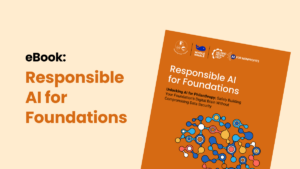Artificial intelligence has transformed how applicants and reviewers handle grant applications.
AI grant applications streamline the process, providing grantees with the tools to personalize their proposals and reviewers with the ability to quickly identify candidates who are not a good fit.
But is the use of AI in grant reviews and applications ethical? And what does it mean for those who are committed to equitable grantmaking?
This article breaks down the benefits, challenges, and ethical considerations grantmakers must navigate as AI becomes more common in the funding space.
AI is changing the way we give
One of the most promising features of AI is its ability to streamline processes.
For grant seekers, it can help them write grant proposals more efficiently, allowing them to focus on broader opportunities to make a meaningful difference in their communities.
For grantmakers committed to equitable practices, AI introduces both opportunities and new responsibilities to ensure fair review practices.
When thoughtfully adopted, AI can have a positive impact. But if used carelessly, it can unintentionally widen access gaps or reinforce existing bias.
How AI is entering the grant application process
Generative AI tools, like ChatGPT, are transforming the way grantees and reviewers approach the application process.
For grant seekers, it can help reduce their costs and save time. Instead of hiring an external grant writer, these tools enable grantees to draft proposals, conduct research, and craft structured responses to application questions with ease.
On the review side, funders use AI to help quickly parse through applications, flag errors in both the application and their reporting, and analyze data. What would normally take hours or weeks to review can now be done in half the time. Many organizations are beginning to adopt grant application management software with built-in AI tools to help grantees structure proposals and help reviewers manage submissions more efficiently.
For example, Foundant platform users can launch the AI summary feature to quickly generate summaries from LOIs, applications, and follow-ups. These summaries are available to all stakeholders with access to the shared dashboard, making it easier for everyone involved to stay informed. Foundant’s solutions are designed specifically for the funding side of the equation, empowering grantmakers with ethical, scalable, and intuitive tools to streamline workflows.
Efficiency gains and what you might miss
The biggest benefit of AI is efficiency. It helps reduce review times, giving internal staff their time back and allowing them to provide strategic support in other areas. For example, donor prospecting requires significant time, and 13% of nonprofits use AI to help them identify potential funders.
AI can be especially helpful for funding teams to automate their workflows to award grants, manage them, and disburse funds in a timely manner. AI also enhances grant tracking, helping funding teams monitor application progress, identify bottlenecks, and ensure timely communication with applicants.
While AI can be a valuable addition to any organization’s review process, it requires human oversight. Over-reliance on the tool may inadvertently cause funders to overlook critical context, nuance, or community-specific language.
Equity and access concerns for grantseekers
AI in grant applications also raises concerns about equity and access.
Grantseekers who use AI to streamline their applications or write their LOIs can submit more proposals faster than those without access to AI tools.
As AI use in the nonprofit sector increases its efficiency and effectiveness, it may potentially exacerbate existing inequities. Those who do not use AI in their application processes may miss out on critical funding opportunities.
While AI can boost efficiency, grantseekers should proceed with caution. Without extensive prompting and training, generative AI applications often generate generic texts, removing the authentic voice and tone from proposals from small, grassroots organizations.
What ethical AI use looks like for grantmakers
It’s easy to understand why grantmakers are hesitant to incorporate AI into their workflows and processes, especially when concerns about ethics, equity, and accessibility arise.
However, there are ethical uses of AI in grant applications. Responsible grantmakers who use AI recognize that human oversight is essential, particularly before finalizing grant approvals. Human oversight ensures their decisions align with their values, missions, and goals.
Before automating your workflows with AI, ask:
- Is this tool helping us make fairer, more informed decisions?
- Are we accounting for the potential of bias in the data or algorithms?
- Are we transparent about how we’re using AI with both staff and applicants?
The answers to these questions will help guide your ethical use of AI, while ensuring that your commitment to transparency, fairness, and accountability remains the standard throughout your entire review process. Ethical software for grantmakers should support transparency, enable human oversight, and help reduce unintentional bias, not replace thoughtful decision-making.
AI as a support tool, not a replacement
While AI can be powerful, it should complement the thoughtful, values-driven decision-making that defines meaningful philanthropy. Throughout the entire grant lifecycle, AI tools can assist with early-stage application screening, mid-cycle reporting, and post-award follow-ups, helping reviewers stay aligned with impact goals.
AI can help:
- Identify red flags and inconsistencies in data or grant application submissions.
- Pre-screen applications to ensure submissions align with award requirements.
- Generate high-level summaries and overviews of submitted applications and applications already in review.
It’s important to remember that AI is a tool. Although it speeds up processes, it lacks the ability to detect nuance or create an emotional connection.
Human-led judgement, especially in final decisions, is needed. With human reviewers as the final decision-makers, you can ensure awards are fairly disbursed to grantseekers who align with your mission, values, and commitment to making a positive community impact.
Questions to ask before adopting AI in your process
If you’re searching for an AI tool to automate your grantmaking processes, do your research.
Keep these questions and tips in mind:
- What type of data is being used or analyzed?
- It’s essential to understand the origin of your data and how AI processes it. Without this understanding, it becomes challenging to award grants ethically based on both merit and need.
- Are applicants aware that AI is part of the process, and do they have a choice in this matter?
- AI can be a touchy subject. If your tool or software lacks transparency, it can lead to distrust from applicants. Ensure your tool is transparent to foster confidence with your grantees and grantseekers.
Ultimately, your choice of AI tools should reflect your values as much as your operational needs. By approaching AI adoption with curiosity, caution, and a commitment to transparency, grantmakers can embrace innovation while safeguarding the trust and equity at the heart of effective philanthropy.
How grantmakers can embrace AI responsibly
Implementing AI into your grant review and approval workflows doesn’t have to be all or nothing. Start small by piloting AI within your grant workflow management software to identify which steps in the review process can be safely automated while maintaining equity and context.
Establish clear guardrails to eliminate biases and ensure fairness across your applications and reviews.
Keep your applicants and staff informed about your use of AI to foster trust and transparency. An open line of communication also allows your applicants and reviewer to flag errors early in the process.
Ready or not, AI is here: Let’s lead with integrity
AI’s practical implementation in grantmaking means it’s here to stay. However, using it appropriately to support workflows and speed up the review process depends on grantmakers’ strong commitment to ethics, access, and accountability.
If you’re unsure how AI in grant applications can improve your processes, start a conversation with your team about what ethical, human-first AI adoption could look like in your grantmaking process.
Start a conversation with Foundant to learn more about AI in grant management software ethically and responsibly.
Ready to learn more about AI in philanthropy?

On-demand webinar
Responsible AI by Design: Creating Policies That Align Technology with Your Mission
Discover best practices and expert tips with Nathan Chappell

